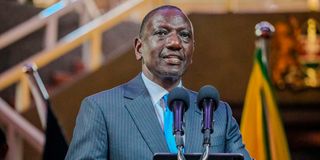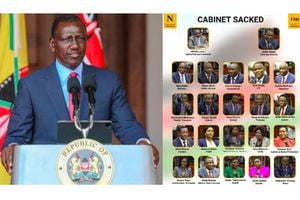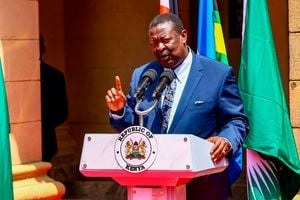
President William Ruto addresses journalists at KICC, Nairobi on July 9, 2024.
President William Ruto faces complex competing political interests, a desire to secure his legacy and re-election, a compulsion to pick technocrats and a demand for regional balance as he embarks on the process of reconstituting his Cabinet.
The President will also be seeking to meet a raft of demands by the youth – which include appointing professionals to relevant ministries – to assuage widespread disaffection among them. The youth have in the last two weeks taken the country hostage with mass protests, forcing the President to make unprecedented concessions among them the withdrawal of Finance Bill, 2024.
At the heart of the competing political interests is the desire by the President to embrace the opposition in a decision that could entail co-opting some of the allies of veteran politician Raila Odinga in his administration. He will be seeking to achieve without causing a political implosion, especially from his deputy Rigathi Gachagua’s political wing.
There is already a rift between Dr Ruto and Mr Gachagua. An escalation of the wrangles would be distractive going into 2027 polls for a President who is trying to pull himself out of a political storm that nearly cost him his career.
The disbanded 22-member Cabinet was largely made of individuals from regions perceived to have voted for President Ruto in the 2022 General Election, mostly the populous Mt Kenya and Rift Valley.
The President is expected to use the moment to address some of the complaints that his appointments have largely remained skewed to benefit only some regions. He has since announced his plans for a “broad-based political arrangement” in coming up with a lean but more effective government.
Mr Gachagua has in the past reminded the opposition that the Kenya Kwanza administration was like a shareholding company, and only those who put it in office have higher stakes.
“This government is a company that has shares. There are owners who have the majority of shares, and those with just a few, while others do not have any. You invested in this government and you must reap. You sowed, tilled, put manure and irrigated, and now it is time to reap,” Mr Gachagua repeatedly said when major appointments were being made.
The immediate former Cabinet Secretaries Kithure Kindiki (Interior), Njuguna Ndung’u (Finance), Zacharia Njeru (Water, Sanitation & Irrigation), Moses Kuria (Public Service), Alice Wahome (Lands, Public Works, Housing and Urban Development), Mithika Linturi (Agriculture) and Attorney General Justin Muturi are all from the larger Mt Kenya region.
Cabinet Secretaries Kipchumba Murkomen (Roads and Transport), Davis Chirchir (Energy), Florence Bore (Labour and Social Protection) and Simon Chelugui (Co-operatives and Micro, Small and Medium Enterprises) are from Rift Valley.
Sacrifice some allies
Dr Ruto’s pronouncement to engage other political players, especially the opposition, means he will have to sacrifice some of his allies who helped him ascend to power to accommodate other parts of the country as well as to respond to the demands of the youths, who have demanded a Cabinet of integrity and performers.
“I will immediately engage in extensive consultations across different sectors and political formations, with the aim of setting up a broad-based government that will assist me in accelerating and expediting the necessary, urgent and irreversible, implementation of radical programmes to deal with the burden of debt, raising domestic resources, expanding job opportunities, eliminate wastage and unnecessary duplication of a multiplicity of government agencies and slay the dragon of corruption consequently making the government lean, inexpensive, effective and efficient,” the President assured.
Mr Raila Odinga’s Orange Democratic Movement (ODM) on Friday, July 12, signalled their intention to engage in talks about the new-look government.
Political analyst Jevans Bigambo says the President has to resist the temptation of recycling political leaders. He says that Dr Ruto would have to make tough choices of whether he wants to please his political allies or to respond to the demands of the majority of Kenyans.
“If the President chooses to elevate political compromises, he would be failing his legacy. It would be a misguided step for the President to reconsider the fired ministers back to the Cabinet because it would not make sense having dismissed them based on poor performance,” said Mr Bigambo.
“If the desire is to have a fresh start, he should not consider old faces. If he brings people like (Mohammed) Junet, (Hassan) Joho or (Wycliffe) Oparanya from the opposition it would be another game of musical chairs and would have ruined his legacy when he has an opportunity to redeem his image,” he adds.
Uriri MP Mark Nyamita says the President has an opportunity to make the country more cohesive by appointing a Cabinet that can respond to the needs of the majority of Kenyans.
“It's refreshing to see him rise to the occasion and show that he is in charge. My hope is that the next cabinet will be a true reflection of the nation not only by region but also the population demographics,” says Mr Nyamita.
Central Organisation of Trade Union (Cotu) Secretary-General Francis Atwoli has also appealed to the President to respond to the demands of the youths by appointing competent individuals.
“As the President embarks on the process of forming a New Cabinet, we urge him to prioritise national unity and inclusivity. The new Cabinet should reflect the diverse fabric of our society, ensuring that it must be all-inclusive and broadly representative,” says Mr Atwoli.
New political war front
Analysts believe that Dr Ruto may succeed in responding to the youths as well as embracing the opposition, but could end up creating a new political war front with his deputy, Mr Gachagua should he feel targeted by the shake-up of the government.
Mr Gachagua has previously openly complained of an attempt to sideline him despite contributing to Kenya Kwanza’s victory, with his allies threatening to lead the region away from the President.
He has admitted that the ruling party has lost its popularity among Kenyans for failing to listen to their demands. Mr Gachagua has also been fomenting rebellion against the government, especially in the populous Mt Kenya which voted the current regime to the last man.
Although it is the prerogative of the President to appoint his Cabinet, it is through consultation with his deputy, whom they were elected with on a joint ticket. But with the bad blood between the two, which is now public, it is not clear if the President will engage him. Mr Gachagua was on Thursday, July 11, conspicuously missing at State House when the President dissolved the Cabinet.
“Bringing Raila into a handshake government will collapse the centre of power in terms of the 2022 alliance of Mt. Kenya and Rift Valley. He is a master of distorting ruling coalitions as Ruto saw after 2018. However, he might have no choice as ironically Raila might be his only chance of limping through his first term into 2027 as a lame duck president,” says Prof David Monda, a university lecturer and political analyst.
“What will DP Gachagua do? If he continues his backroom undermining of his boss Ruto, he will only weaken the government. Might this be an opportune time to call the President's bluff and drive a hard bargain? Should DP Gachagua demand that if Raila or Azimio are introduced into government, Mt. Kenya is out of his government forcing him to call for snap elections? Might this be why the DP has been seeking rapprochement with Uhuru Kenyatta?’ poses Prof Monda.
Another university lecturer, Prof Macharia Munene, says President Ruto has to be broadminded when reconstituting his Cabinet to avoid mistakes made when picking the disbanded team.
“He has to build confidence by picking credible people. He needs to appear to be serious in addressing some of the demands of the youth. If he wants to survive, let him appease the people and not the political leaders,” says Prof Munene.










